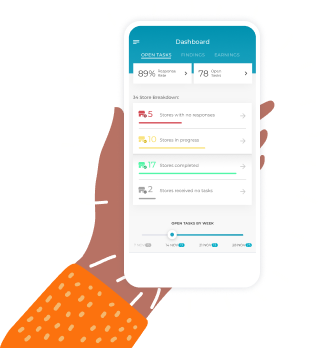Anyone who’s ever worked in retail will tell you there’s a disconnect between store personnel and corporate retail teams. To customers, this might look like a retail employee engagement problem.
Part of the challenge is employee turnover. According to a study by global consulting firm Korn Ferry, 29% of retail HR teams reported an increase in employee turnover from the beginning to the end of 2018, with part-time hourly store employees having an 81% turnover rate, the highest of all retail positions.
Beyond this, store teams see their corporate peers as having cushy jobs and zero insight into what’s actually going on in stores. Some corporate employees see their in-store counterparts as lacking in motivation and lazy on follow through.
In my experience working on both sides of the fence, both assumptions are wrong. While corporate teams know what good retail is, they operate in a world of how things in stores “should be,” as opposed to how they actually are.
In other words, they discount the impact of the shortcomings in staff onboarding and ongoing training, which contributes to poor retail employee engagement. Additionally, store teams are often grappling with a host of daily frustrations that aren’t on corporate’s radar.
If you’re working in the corporate office, here are some things you can do to energize your store staff.
1. Enact team-based commission.
It’s not hard to see why morale might be low among store employees. According to the Federal Bureau of Labor Statistics, “competition from online sales will lead to employment declines in brick-and-mortar stores.” According to the National Retail Federation, the industry has more than twice the number of young workers than the national average (30 percent vs. 14 percent are under the age of 25). And a whopping 58% of these young workers work only part-time.
One could surmise that a good portion this part-time, entry-level workforce has professional aspirations beyond working in retail. If rising through the ranks with your brand isn’t on their wish list, you’re going to have to motivate them with money.
Why not crunch the numbers and see whether team-based commission can work in your retail environment? Unlike a traditional commission structure, team-based commission curbs associate-to-associate competition, a hidden customer-experience killer. Set an achievable goal for your team and give them a bonus if they meet (and even more if they exceed) it. Divide the bonus by each employee’s share of hours worked and no one will argue whether it’s fair or unfair.
2. Mind their time.
Ahh, the luxuriousness of working Monday through Friday, 9 to 5. To store employees, their time feels up for grabs. All-nighters, early AMs, weekends, holidays—you name it, they might have to work it.
One of their biggest gripes is that store managers don’t give them their schedule sufficiently in advance. Make sure your store managers are releasing store schedules as early as they possibly can.
If they can, have them take their accommodations a step farther. Why not ask everyone on the team whether they need to request specific days off at the beginning of the month. You might not be able to deliver on everyone’s needs, but they’ll appreciate being asked.
3. Insist on autonomy.
Take it from me: as a former store manager I can attest that many of them are guilty of being control freaks. They want their stores to look a certain way and they want sales to be handled a certain way. But no one wins when store managers fail to let their store associates manage processes for themselves.
When store managers micro-manage their teams, it stunts growth. Let a new sales associate merchandise the front of the store the way she thinks is best. Let someone else rework the way you organize your stockroom. If something they do doesn’t work, you can always change it back. But even so, they’ll feel inspired by your faith in them and might lighten your load by taking the lead on future projects as a result.
4. Recognize their individuality.
In corporate offices, we recognize the strengths and (if we’re being honest) shortcomings of individual workers. Joe’s great at taking projects across the finish line. Daria is a big picture thinker. Matthew is a natural born leader. Yet somehow in retail stores, we expect people to perform their jobs the exact same way.
There’s a structure to the way we do things to operate a retail business. Unlock the doors. Turn on the lights. Log into the POS. And the list goes on. But workers in stores are as much individuals as anyone else. And you can’t expect everyone to perform the same way as their neighbor. Rather than expect everyone to perform their job responsibilities the same way, train your store managers to recognize and nurture the talents and passions of individual contributors.
5. Build a ladder.
There’s not always a clear path to career advancement in retail stores. The truth is, you need good, seasoned people on your floors in order to deliver excellent in-store experiences. But it’s a double-edged sword. Employees with no clear path to advance aren’t likely to be happy working for you, and their apathy could taint how they interact with customers and mind (or don’t mind) your floors.
Walmart, the US’s biggest private employer, has long struggled to satisfy its mammoth-sized workforce. But recent developments sound promising. Bloomberg writes that the superstore is piloting a new store-level management structure, coined “Great Workplace,” in 75 of its smaller Neighborhood Market grocery stores and soon in over 50 of its supercenters.
The plan for Great Workplace involves pay raises for floor supervisors, as well as advancement opportunities for lower level employees including enhanced training, support, and more recognition for strong performance. For instance, Walmart will offer incentives for good attendance, more personalized training and interactions with their supervisors, as well as the opportunities to become “business leads” and “team leads,” whose pay grade is higher than that of Walmart’s average sales associate.
In another example, Publix has a “promote-from-within” policy, which they call “succession planning.” Employees who want to work full-time are invited to submit “registration[s] of interest” via Publix’s employee portal. Once they do so, they can begin the process of moving up-ladder with the grocer. Policies like these have kept Publix near the top of Fortune’s 100 Best Companies to Work For rankings for over 22 years.
Without a wholescale organizational change, Walmart’s Great Workplace and Publix’s “succession planning” should give store teams a greater sense of upward mobility and a deeper connection to the corporation at large. You don’t have to be Walmart to make this kind of change to the way you advance your retail workforce. You just have to be willing to make incremental changes that show you’re invested in your team and their career trajectory.
6. Empower with technology.
There are all kinds of apps that can enable store associates to more efficiently perform their jobs. An app can make your retail workforce feel valued while enhancing their performance. Rather than having to carry around a binder full of paper, mobile apps help retailers reach team members where they are: their phones.
These apps take many forms. Sam’s Club developed “Ask Sam,” which allows associates to access information about the company by asking questions through their mobile phones. Questions about anything from work schedules to store layout are fair game.
In another example, Phillips-Van Heusen (PVH), the apparel conglomerate behind Calvin Klein, Tommy Hilfiger, and IZOD partnered with SocialChorus to create a training app that would reach its 35,000 employees across the world, 68% of whom work from remote locations. The mobile app allowed employees to established channels focused on various information categories and create personalized newsfeeds.
It’s worth nothing that just giving stores an app doesn’t necessarily translate to greater employee engagement. Retailers should focus on apps that reduce friction (like scheduling apps) or clearly empower your workforce and drive sales.
CB4 is a workforce enablement tool that uses AI and machine learning to enhance the way store teams work. Each week CB4 sends stores recommendations to correct operational and visual merchandising issues on their floors that holding back sales and causing friction for shoppers. Store managers give feedback within the app, and then machine learning kicks in to strengthen CB4’s recommendations over time to drive more revenue.
Our contribution to revenue is crystal clear and we boast a 95% store compliance rate, meaning that store teams act on 95 out of 100 recommendations CB4 sends. Ready to learn more? Request a demo or watch a video to see how it works.


